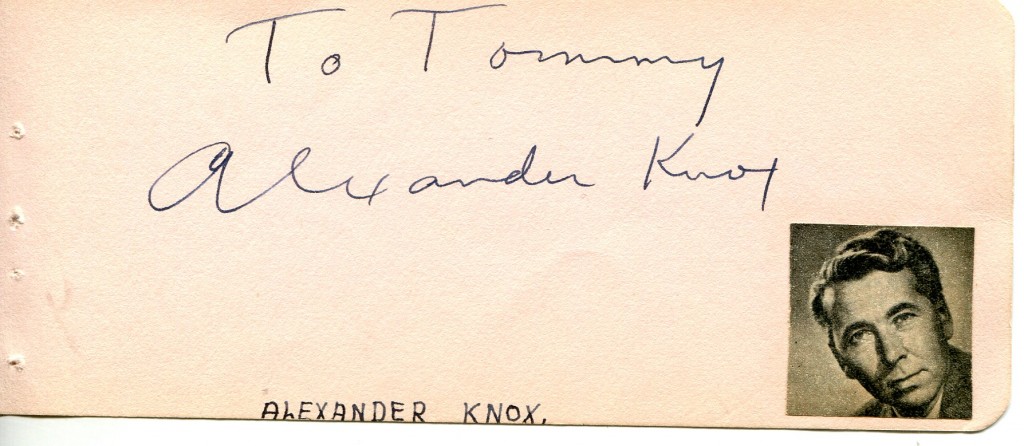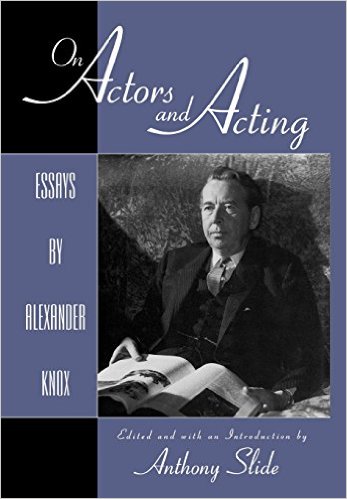
Adam Benedick’s obituary of Alexander Knox in “The Independent” in 1995:
He was playing with drily persuasive conviction one of Ibsen’s artists rediscovering a soulmate – a sexually insensitive egotist and idealist whose relationship with his uninspiring and disenchanted wife makes way for a reunion with a former model.
She had sat for the ageing sculptor’s masterpiece without inciting his lust. She (Wendy Hiller) could never forgive him. He, the cold, high-principled thinker, was crucially unaware of her needs.
The spectacle, with lesser players, might have been laughable, but Ibsen, given the right director, can be marvellously bracing; and Knox, the stillest and sometimes subtlest of players, had us in his palm as he moved up the menacing mountain towards the inevitable symbol of personal failure – with the bride-like Hiller at his side. It may have been her evening in its dignified evasion of absurdity, but it was Knox who commanded that peninsular stage – Tyrone Guthrie’s famous but tricky invention – to an extent which drove away all irreverent thoughts while he was on it.
He had been powerful before, in his quiet way, on London stages. In Ugo Betti’s The Burnt Flowerbed (Arts, 1955) he had played another Ibsenish character of symbolic and highly imaginative importance; and more strikingly still in Clifford Odets’s Winter Journey (St James’s) he had succeeded Michael Redgrave as the flamboyantly neurotic and drunken American actor trying to make a comeback. Even before the Second World War he was something of a name in London. At the Old Vic he had played opposite Laurence Olivier as Dr McGilp in James Bridie’s The King of Nowhere, in which he had a particular success; and he was in several of Shaw’s later plays like Geneva (1938) and, at Malvern Festival, Good King Charles’s Golden Days.
At the Old Vic he had been noted in Ralph Richardson’s Othello for a “strongly humanised” Brabantio and for Emlyn Williams’s Richard III (as Catesby) he gave “a secret, dour-lipped performance” which left at least one critic guessing. It was however as Snout in Guthrie’s A Midsummer Night’s Dream that Knox’s acting “leapt to life” – “mournful of face with a voice dripping melancholy, and a shy nervous habit of running his hand through his hair and down his side – the very lyricism of woe”.
When a young actor provokes that kind of notice as one of the “rude mechanicals” his future as a comedian might seen assured, but it was not to be in comedy that Knox came to matter, but rather as a serious, even sombre classical actor.
After the outbreak of war he returned to America and was snapped up by Hollywood, again with little scope for comedy but with a gift for playing characters rather older than himself, such as President Woodrow Wilson in Wilson (in a chilling pince-nez), for which he was nominated as best actor of 1945 in the Academy Awards.
He also acted on Broadway, with some distinction, as Baron Tuzenbach in The Three Sisters and in Hollywood and the European cinema gave generally admired performances as professors, psychiatrists, judges, neurotics and other figures of usually grave authority. One of his more memorable screen appearances came opposite Ingrid Bergman in Rossellini’s Europa 51, otherwise entitled No Greater Love; but back in England in the 1950s he had shown his quality in Guthrie’s Henry VIII at the Old Vic. Guthrie had a specific if distorted notion of Wolsey which made it impossible for Knox to be true to Shakespeare, but as several critics recognised, he remained true to his own gifts of passion, bitterness, ribaldry and irony.
Adam Benedick
The above “Independent” obituary can also be accessed online here.
Alexander Knox, actor: born Strathroy, Ontario 16 January 1907; married Doris Nolan; died Berwick-upon-Tweed 26 April 1995.




